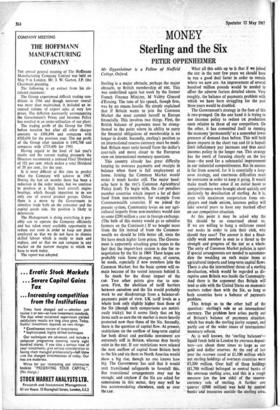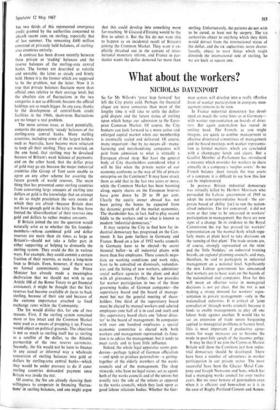Sterling and the Six MONEY
PETER OPPENHEIMER
Mr Oppenheimer is a Fellow of Nuffield College, Oxford.
Sterling is a major obstacle, perhaps the major obstacle, to British membership of En. Thus was underlined again last week by the former French Finance Minister, M Valdry Giscard d'Estaing. The tone of his speech, though firm, was by no means hostile. He simply explained that if Britain wants to join the Common Market she must commit herself to Europe financially. This involves two things. First, the British balance of payments must be streng- thened to the point where its ability to carry the financial obligations of membership is no longer in doubt. Secondly, sterling's position as an international reserve currency must be modi- fied. Britain must untie herself from the dollar's coat-tails and move closer to the European view on international monetary questions.
This country already has great difficulty keeping its overseas payments and receipts in balance when there is full employment at home. Joining the Common Market would make it much harder still. The major head- ache here is the EEC'S Common Agricultural Policy (cAP). To begin with, the CAP penalises member countries which import a lot of their food from non-members, for example from Commonwealth countries. If we joined the present system, Community levies on our agri- cultural imports from non-members would cost us some £200 million a year in foreign exchange. (The bulk of this money would go to subsidise farmers on the Continent.) If we bought more from the Six instead of from the Common- wealth we should be little better off, since the Six have much higher farm prices. The Govern- ment is apparently attaching great hopes to the fact that the import-levy system is due for re- negotiation by the Six in 1969. These hopes are probably vain. Some changes may, of course, be made, especially if new members join the Common Market; but the basic system will re- main because of the vested interests behind it.
So much for the direct impact of the CAP. Two other points give rise to con- cern. First, the abolition of tariff barriers between ourselves and the Six would probably work to our disadvantage from a balance-of- payments point of view. UK tariff levels as a whole look only slightly higher than those of the Six (though such comparisons are notori- ously tricky); but it seems likely that on big items such as can the UK market is more heavily protected now than those of the Six. Secondly, there is the question of capital flow. At present, restrictions on the outflow of long-term capital for both direct and portfolio investment are extremely stiff in Britain, whereas they barely exist in the EEC. If our restrictions were relaxed the next outflow of capital from Britain both to the Six and via them to North America would show a big rise, though no one knows how big. The Government has said that it would seek transitional safeguards to forestall this. But transitional arrangements may not be enough; and anyhow if the Six are asked for concessions in this sector, they may well be less accommodating elsewhere, such as over the CAP. What all this adds up to is that if we joined the EEC in the next few years we should have to run a good deal faster in order to remain where we now are. An improvement of several hundred million pounds would be needed to offset the adverse factors detailed above. Very roughly, the balance of payments problem with which we have been struggling for the past three years would be doubled.
The Government's strategy in the face of this is two-pronged. On the one hand it is trying to use incomes policy to reduce int production costs relative to those of our competitors. On the other, it has committed itself to running the economy 'permanently' at a somewhat lower pressure of demand than before. This will hold down imports in the short run and (it is hoped) limit inflationary pay increases and thus assist incomes policy in the longer run. This strategy has the merit of focusing clearly on the key issue—the need for a substantial improvement in our industrial competitiveness. But its success is far from assured, for it is essentially a long- term strategy, and enormous difficulties must be overcome in order to keep it going. It would make much better sense if an initial boost to competitiveness were brought about quickly and decisively by devaluation of sterling. As it is, even with maximum cooperation from em- ployers and trade unions, incomes policy will take several years to have any marked effect on our competitive situation.
At this point it may be asked why the Six should be so concerned about us. If we are willing to hang a millstone round our necks in order to join their club, why should they care? The answer is that a finan- cially weak member is seen as a threat to the strength and progress of the EEC as a whole. The unity of Common Market policies is upset if special arrangements are needed to accommo- date the weakling on such major items as agricultural imports and long-term capital flows. There is also the intermittent threat of a sterling devaluation, which would be regarded as dis- ruptive once Britain was inside the Community. And there is the argument that Britain will tend to side with the United States on economic matters rather than with the Six, so tong as both countries have a balance of payments problem.
This brings us to the other half of the question : sterling's role as an international currency. The problem here arises partly out of Britain's balance of payments situation, which has made the sterling parity suspect, and partly out of the wider issues of international monetary reform.
As is well known, the 'sterling balances'— liquid funds held in London by overseas deposi- tors—are about three times as large as our gold and dollar reserves. At the end of last year the reserves stood at £1,100 million while net sterling holdings of overseas countries were £3,200 million, Over half of these holdings (£1,700 million) belonged to central banks of the overseas sterling area, and this is a rough measure (on the low side) of the reserve- currency role of sterling. A further one quarter (£900 million) was held by central banks and treasuries outside the sterling area, but two thirds of this represented emergency credit granted by the authorities concerned to absorb recent runs on sterling, especially that of last summer. The remaining £600 million consisted of privately held balances, of sterling- area countries entirely.
A contrast has been drawn recently between these private or 'trading' balances and the reserve balances of the sterling-area central banks. The former are described as volatile and unstable, the latter as steady and firmly held. Hence it is the former which are supposed to be the problem, not the latter. Now it is true that private balances fluctuate more than official ones relative to their average level; but the absolute size of fluctuations in the two categories is not so different, because the official holdings are so much bigger. In any case, thanks to the development of central-bank credit facilities in the 1960s, short-term fluctuations are no longer a real problem.
The more serious issue, at least potentially, concerns the apparently 'steady' balances of the sterling-area central banks. Many sterling countries, including some of the largest holders such as Australia, have become most reluctant to keep all their sterling. They are worried, on the one hand, that sterling may be devalued because of Britain's weak balance of payments; and on the other hand, that the dollar price of gold may go up, because the major industrial countries (the Group of Ten) seem unable to agree on any other scheme for assuring the future growth of world reserves. The main thing that has prevented outer, sterling countries from converting large amounts of sterling into dollars or gold is the knowledge that an attempt to do so might precipitate the very events of which they are afraid—because Britain does not have enough gold in,the kitty. So they have limited the 'diversification' of their reserves into gold and dollars to rather modest amounts.
If Britain joined the EEC the question would naturally arise as to whether the Six founder- members7-7Whose -combined gold and dollar reserves are more than six times as large as Britain's—should not take a fuller part in either supporting or helping to dismantle the sterling system. They could do this in various ways. For example, they could commit a certain fraction of their reserves, or make a long-term loan to Britain. Even, however, if there were no formal commitments (and the Prime Minister has already made a meaningless declaration that we should not wish to use Article 108 of the Rome Treaty to get financial assistance), it might be thought that the Six's reserves had become available de facto to back sterling, because of their size and because of the extreme importance attached to fixed exchange rates within the Community.
The Six would dislike this, for one of two reasons. First, if the sterling system remained more or less intact and the Common Market were used as a means of propping it up, France would object on political grounds. The objection is not so much to sterling itself but to sterling as a satellite of the dollar, to the Atlantic partnership of the two reserve currencies. Secondly, the Six would not be keen to finance . in any casual or .informal way a wholesale conversion of sterling balances into. gold or dollars by sterling-area central banks—which . they would be under pressure to do if outer sterling countries demanded payment once Britain was inside the Of course, the Six are already showing their willingness to cooperate in, financing 'fluctua- tions' in sterling balances, and one might argue that this could develop into something more far-reaching. M Giscard d'Estaing would be the first to admit it. But the Six do not want this to happen as an incidental result of Britain's joining the Common Market. They want it ex- plicitly thrashed out in the context of inter- national monetary reform, and France in par- ticular wants the dollar demoted far more than
sterling. Unfortunately, the patients do not wish to be cured, at least not by surgery. The us authorities object to anything which they think would detract from the international status of the dollar, and the UK authorities. more shame- facedly, object to most things which might diminish the international role of sterling. So we are back at square one.































 Previous page
Previous page